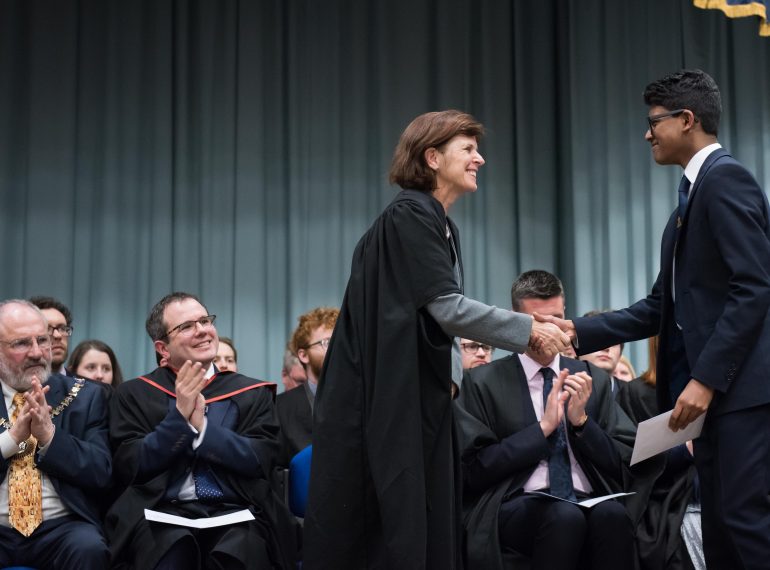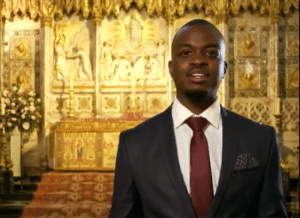
New research highlights the success of grammar schools in sending large numbers of pupils from black and minority ethnic backgrounds to top universities.
The Higher Education Policy Institute (HEPI) study shows not only that students of all backgrounds are much more likely to progress to a top-tier university if they have been educated in an area with grammar schools, but that this is particularly true for those from black and minority ethnic (BME) backgrounds.
Its publication comes as the magazine of King’s College, Cambridge, reports on Old Elizabethan George the Poet’s key role in the college’s first-ever open day for BME applicants. The magazine explains that although King’s accepts a relatively high number of state school pupils, it remains concerned about the ethnic diversity level among its student body.
Nationally renowned spoken-word performer and social commentator George Mpanga (OE 2002–2009), who himself attended King’s, led an empowerment session for the visiting prospective undergraduates. He told them how his time at Cambridge helped him understand the inner-city community he had come from, giving him an academically-based perspective which has informed his subsequent commentary on race, education and class.
 Headmaster Neil Enright said: “At Queen Elizabeth’s School, we are proud of our long-term success as an entirely meritocratic institution, and it is noteworthy that many of our leavers, such as George, who go on to Oxford and Cambridge are from modest backgrounds, often representing the first generation of their families to go into higher education. Nevertheless, we have made it one of our key priorities to do even more to ensure fair access and we are currently developing our outreach activities accordingly.”
Headmaster Neil Enright said: “At Queen Elizabeth’s School, we are proud of our long-term success as an entirely meritocratic institution, and it is noteworthy that many of our leavers, such as George, who go on to Oxford and Cambridge are from modest backgrounds, often representing the first generation of their families to go into higher education. Nevertheless, we have made it one of our key priorities to do even more to ensure fair access and we are currently developing our outreach activities accordingly.”
The 60-page HEPI research paper, entitled The Impact of Selective Secondary Education on Progression to Higher Education, was written by Iain Mansfield, a former senior civil servant at departments including the Department for Education. Its findings suggest that grammar schools can increase the likelihood of progression to the top third of higher education institutions (as defined by the Department for Education) for pupils from some traditionally disadvantaged groups, including pupils in the most disadvantaged two quintiles, namely social disadvantage and BME. In fact, it showed that the latter are more than five times as likely to progress to Oxbridge if they live in an area with selective schools than in a non-selective area, with England’s 163 grammar schools sending more BME students to Cambridge than all 1,849 non-selective state schools combined.
Commenting on the findings in the Times Educational Supplement, Mr Mansfield makes a plea for expanding grammar schools: “…for many disadvantaged students, grammar schools provide an unrivalled ladder of opportunity, offering them a route to elite higher education that is simply not systematically available to them elsewhere.”
He also tackles one frequent criticism of selective education head-on: “Did you know that that 45 per cent of pupils at grammar schools come from households with below-median incomes? Opponents of grammar schools like to portray them as only for the rich, but this statistic makes that claim demonstrably untrue. Yes, it’s true that grammar schools take a lower proportion of pupils on free school meals than one might expect – but the same is true of the most academically successful comprehensive schools, due to house-price selection.”
For his part, George Mpanga sought to inspire the visiting A-level students at King’s College, telling them: “I’m looking forward to seeing you guys in ten years and you saying to me: ‘Oh, remember that time in King’s? I was there!’ Because you will be someone, wherever you choose to go, you will be of consequence. I anticipate that; I look forward to that.”
 He told them how his own time as an undergraduate had changed him: “When I went to Cambridge, I looked back at my community through binoculars and I could see it for what it is. That wouldn’t have been possible if I’d stayed in the environment. I would have become either consumed by my anger or completely disconnected with the social set-up, with the social scene.
He told them how his own time as an undergraduate had changed him: “When I went to Cambridge, I looked back at my community through binoculars and I could see it for what it is. That wouldn’t have been possible if I’d stayed in the environment. I would have become either consumed by my anger or completely disconnected with the social set-up, with the social scene.
“Being here gave me the space to look at it objectively and apply some of the disciplines of sociology, of the humanities, of the social sciences to what I saw growing up. It gave me that language. And what I found is, when I went back to that environment, everyone understood. No one looked at me funny because I’d gone to Cambridge.”
He recalled the occasion when the President of the African and Caribbean Society had persuaded him to give his first performance at Cambridge. “He was like, ‘You have to contribute. What? You’re just going to be here and you’re not going to give yourself? You’re not going to represent where you’re from in this place?’ And that pricked my conscience a little bit, so I agreed to do it.”
